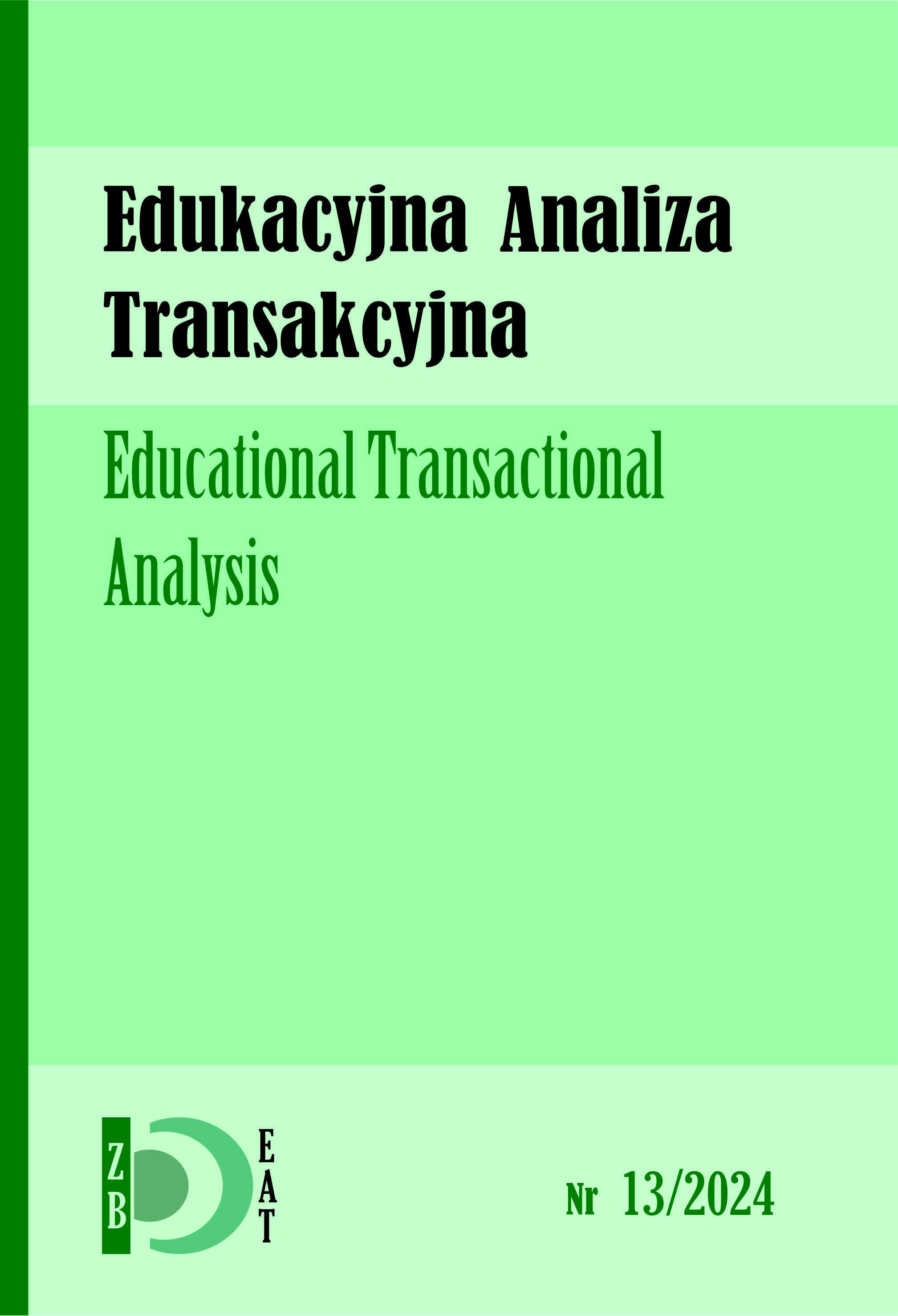The Integrative approach in transactional analysis as a theory and method in psychotherapy
DOI:
https://doi.org/10.16926/eat.2024.13.03Keywords:
transactional analysis, integrative approach, psychotherapy, relational needs, interpersonal relationshipsAbstract
The aim of this article is to analyze the integrative approach in transactional analysis (TA) as both a theory and method in psychotherapy. The contemporary integrative approach in TA expands traditional theoretical frameworks by incorporating elements from other schools of psychotherapy. This article discusses the core concepts of transactional analysis such as Ego states and life scripts within the integrative perspective, while also presenting specific to this approach concepts and methods in therapeutic practice. Particular attention is given to the dimensions of contact and relational dynamics within therapy.
Downloads
References
Christoph-Lemke, C. (1999). The contributions of transactional analysis to integrative psychotherapy. Transactional Analysis Journal, 29(3), 198-214. https://doi.org/10.1177/036215379902900305
Cierpialkowska, L. (2016). Psychopatologia (pp. 27–28). Wydawnictwo Naukowe Scholar.
Cornell, W. F., & Bonds-White, F. (2001). Therapeutic relatedness in transactional analysis: The truth of love or the love of truth. Transactional Analysis Journal, 31(1), 71–83. https://doi.org/10.1177/036215370103100108
Erskine, R. G. (1975). The ABC’s of effective psychotherapy. Transactional Analysis Journal, 5(2), 163–165. https://doi.org/10.1177/036215377500500218
Erskine, R. G. (1980). Script cure: Behavioral, intrapsychic, and physiological. Transactional Analysis Journal, 10(2), 102–106. https://doi.org/10.1177/036215378001000205
Erskine, R. G. (1988). Ego structure, intrapsychic function, and defense mechanisms: A commentary on Eric Berne's original theoretical concepts. Transactional Analysis Journal, 18(1), 15–19. https://doi.org/10.1177/036215378801800104
Erskine, R. G. (1991). Transference and transactions: Critique from an intrapsychic and integrative perspective. Transactional Analysis Journal, 21(2), 63–76. https://doi.org/10.1177/036215379102100202
Erskine, R. G. (1998). The therapeutic relationship: Integrating motivation and personality theories. Transactional Analysis Journal, 28(2), 132–141. https://doi.org/10.1177/036215379802800206
Erskine, R. G. (2003). Introjection, psychic presence, and parent ego states: Considerations for psychotherapy. In C. Sills & H. Hargaden (Eds.), Ego states (Vol. 1, pp. 83–108). Worth Publishing.
Erskine, R. G. (2008). Psychotherapy of unconscious experience. Transactional Analysis Journal, 38(2), 128–138. https://doi.org/10.1177/036215370803800206
Erskine, R. G. (2009). Life scripts and attachment patterns: Theoretical integration and therapeutic involvement. Transactional Analysis Journal, 39(3), 207–218. https://doi.org/10.1177/036215370903900304
Erskine, R. G. (2013). Vulnerability, authenticity, and intersubjective contact: Philosophical principles of integrative psychotherapy. International Journal of Integrative Psychotherapy, 4(2).
Erskine, R. G. (2018/2010). Life scripts: A transactional analysis of unconscious relational patterns. Routledge.
Erskine, R. G. (2018/2015). Relational patterns therapeutic presence: Concepts and practice of integrative psychotherapy. Routledge.
Erskine, R. G. (2019). The life script trilogy: Acceptance speech on receiving the 2018 Eric Berne Memorial Award. Transactional Analysis Journal, 49(1), 7–13. https://doi.org/10.1080/03621537.2019.1544773
Erskine, R. G., & Moursund, J. P. (2022/2004). The art and science of relationship. Phoenix Publishing House.
Erskine, R. G., Moursund, J. P., & Trautmann, R. L. (1999). Beyond empathy: A therapy of contact-in-relationship. Brunner/Mazel.
Erskine, R. G., & Trautmann, R. L. (1996). Methods of an integrative psychotherapy. Transactional Analysis Journal, 26(4), 316–328. https://doi.org/10.1177/036215379602600410
Erskine, R. G., & Zalcman, M. J. (1979). The racket system: A model for racket analysis. Transactional Analysis Journal, 9(1), 51–59. https://doi.org/10.1177/036215377900900112
Grégoire, J. (2007). Les orientations récentes de l’analyse transactionnelle. Les Editions de l’Analyse Transactionnelle.
Hargaden, H., & Sills, C. (2002). Transactional analysis: A relational perspective. Routledge.
Joines, V. (1991). Transference and transactions: Some additional comments. Transactional Analysis Journal, 21(3), 170–173. https://doi.org/10.1177/036215379102100308
Lambert, M. J., & Barley, D. E. (2001). Research summary on the therapeutic relationship and psychotherapy outcome. Psychotherapy: Theory, Research, Practice, Training, 38(4), 357–361. https://doi.org/10.1037/0033-3204.38.4.357
Leigh, E. (1999). Introduction to the 1998 Eric Berne Memorial Awards. Transactional Analysis Journal, 29(1), 9–10. https://doi.org/10.1177/036215379902900104
O'Reilly-Knapp, M. (2001). Therapeutic love, intellectual truth, and theoretical understandings: A clinical application of the theory and methods of integrative psychotherapy. Transactional Analysis Journal, 31(4), 274–282. https://doi.org/10.1177/036215370103100411
O'Reilly-Knapp, M., & Erskine, R. G. (2003). Core concepts of an integrative transactional analysis. Transactional Analysis Journal, 33(2), 168–177. https://doi.org/10.1177/036215370303300208
Salinger, R. A. (1996). Therapeutic involvement: The bull becomes attuned. Transactional Analysis Journal, 26(4), 293–302. http://dx.doi.org/10.1177/036215379602600405
Stark, M. (1999). Modes of therapeutic action: Enhancement of knowledge, provision of experience, and engagement in relationship. Jason Aronson Inc.
Trautmann, R. L., & Erskine, R. G. (1981). Ego state analysis: A comparative view. Transactional Analysis Journal, 11(2), 178–185. https://doi.org/10.1177/036215378101100218
Trautmann, R. L., & Erskine, R. G. (1999). A matrix of relationships: Acceptance speech for the 1998 Eric Berne Memorial Award. Transactional Analysis Journal, 29(1), 14–17. https://doi.org/10.1177/036215379902900106
International Integrative Psychotherapy Association. (n.d.). https://integrativeassociation.com/ (Accessed October 16, 2024).
International Journal of Integrative Psychotherapy. (n.d.). https://doaj.org/toc/2156-9703 (Accessed October 16, 2024).
What is Integrative Psychotherapy? (n.d.). Downloaded from https://integrativeassociation.com/what-is-integrative-psychotherapy/ (Accessed October 16, 2024).
What is Integrative Psychotherapy? (n.d.). Downloaded from https://www.integrativetherapy.com/en/integrative-psychotherapy.php (Accessed October 16, 2024).
Winners of the Eric Berne Memorial Scientific Award and the Eric Berne Memorial Award. (n.d.). Downloaded from https://membersarea.itaaworld.com/sites/default/files/itaa-pdfs/award-procedures/EBMA%20WINNERS%20AS%20OF%2010-23.pdf (Accessed October 16, 2024).
Downloads
Published
How to Cite
Issue
Section
License
Copyright (c) 2024 adam bekier

This work is licensed under a Creative Commons Attribution 4.0 International License.
I am aware that the Educational Transactional Analysis journal is published under a Creative Commons license - Attribution (https://creativecommons.org/licenses/by/4.0/legalcode).
By submitting the article, I agree to make it available under this license

